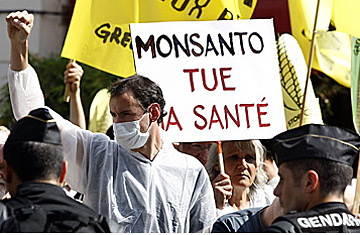
Anti-GMO activists demonstrate in front of the National Assembly as a much disputed law is likely to be approved, which they say blurs the line between natural and GM foods.
The raucous standing ovation of French parliamentarians on Tuesday was a scene French President Nicolas Sarkozy could have done without; it was the opposition Socialists, not his own conservative majority, that were celebrating. The government suffered a surprise defeat over a law on genetically modified crops, but more importantly, the divisions that vote revealed within the French right threaten more trouble for the President in the future.
In any other country, the proposed legislation on the cultivation of genetically modified crop organisms (GMO) would have produced more yawns than fireworks; it was intended only to bring restrictive national laws in line with European Union directives that are more tolerant of GMOs. Yet wide public hostility towards GMOs — combined with disapproval of Sarkozy's heavy-handed leadership style — turned Tuesday's vote into political drama of the first order. Conservatives have an enormous parliamentary majority of 343 out of 577. But on Tuesday, many of them were missing, and others ready to defect to a leftist motion to reject the bill. The result: a razor-thin 136-135 defeat of the government's GMO measure. It was the first time in ten years that an opposition-led effort has defeated legislation proposed by a French government.
"This is a very beautiful lesson for the government and Nicolas Sarkozy," said Green Party legislator Noël Mamère, one of many Sarkozy opponents who have criticized the conservatives for seeking to ram through controversial legislation without consultation or debate. "I hope that, as I speak, the President is eating the Elysée carpet, because this is a victory of the French people over a government that wanted pass a law by force."
José Bové, the environmentalist and anti-globalist who sat in the public gallery during the vote, had a similar message. "This is a collective victory for the citizens of this country who refuse GMOs," he said. "The government will not be able to do anything it wants after this."
French Prime Minister François Fillon immediately convened a committee of both houses of French parliament to review and reintroduce the legislation for another vote, when whips will presumably insure a full turnout to gain passage. Despite public suspicion of GMOs, that shouldn't prove difficult, since the bill is hardly radical. It obliges farmers to separate natural and GMO cultivation, and sets permitted limits of GMO "contamination" to surrounding plots; requires public disclosure of where GMO crops are located; and make the destruction of GMO crops by protesters — an act for which Bové has been repeatedly arrested — a criminal offense. Such measures would be considered minimal in many countries, and will have limited impact even in France, where less than 1% of all crops raised are GMOs. So why all the fuss?
Because of what it says about Sarkozy, of course, who totally dominates political debate in France even as he languishes in the opinion polls. "This setback is mainly significant against the background of serious public displeasure with Sarkozy's leadership, and the growing incidence of conservatives openly defying him and the government to show their disagreement," says Dominique Reynié, a French political analyst and professor at the Fondation National des Sciences Politiques in Paris. Despite the President's recent efforts to alternatively charm and threaten his party members back into order, Reynié says unhappiness over the meager results of Sarkozy's reform agenda have left conservatives disinclined to follow his lead. That wariness among his own allies contributed to the multiplication of problems the increasingly unpopular Sarkozy has faced this year. "As long as he was popular and helping the right win elections, conservatives in parliament were happy to vote through whatever Sarkozy told them to," says Reynié. "Now they are not only refusing to do that, but on issues like the GMO law, openly demonstrating that they stand with the public, not with the President and government."
That does not bode well for Sarkozy, who must get the reintroduced GMO bill passed before tabling sweeping institutional and constitutional reform, including changes to parliament itself, in June. Many conservatives have already expressed concern over such measures and are looking to the left as possible allies to turn them away. If that happens, Sarkozy may soon be hearing more parliamentary applause of the sort he'd prefer to avoid.
